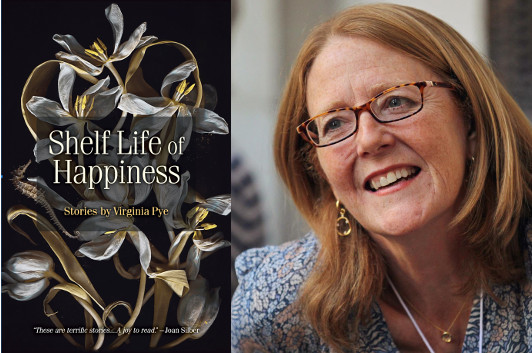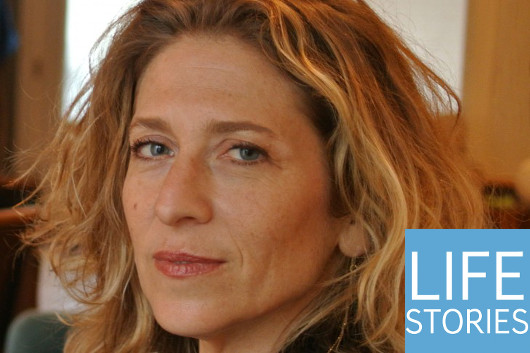Virginia Pye: Black Tickets & Feminist Poets of Another Time

photo: Tennessee Photography
I met Virginia Pye at a book festival down in Richmond ages ago, so I was delighted to hear that she’s got a new short story collection, The Shelf Life of Happiness. In her stories, you’ll see how an elderly painter being courted by a rich young art collector and a teenage skateboarding enthusiast embarrassed to be driven to the skate park by his dad are fighting similar battles. You’ll also spend time with a man who’s accompanying his old friend from college, who’s now dying of AIDS, as he gets married in a remote town that’s little more than a few stores and a motel lining either side of the highway, and a woman who’s struggling to make sense of a brutal murder that stuns her small community. In this essay, Pye shares some thoughts about a story collection, and the poems that preceded it, that helped her clear a path to writing about characters struggling to figure out, let alone assert, their identities.
When I was twenty, Black Tickets, the story collection by Jayne Anne Phillips, with its hard-edged prose about hard-edged people, hit me hard. I’d read Hemingway’s short stories. Fitzgerald and Chekov, too. Isaac Babel and Isaac Bashevis Singer, and that one about the yellow wallpaper that everyone had to read. Unlike novels, short stories seemed the place to start for an aspiring young writer. Stories were like small sculptures, carefully shaped and refined, seemingly comprehensible with a single walk around.
But when I tried to write them, mine tended to sprawl into an unruly mess. My pages grew dense and overwritten as I attempted to say too much. Then I read Black Tickets and saw that when you used restraint, you created meaning in a more powerful way. If you kept it minimal, you could leave your reader aching for more, at least that was the hope. But it wasn’t just Phillips’ style of writing that I admired and wanted to emulate. Her stories hit home because they were about women and girls, not unlike me.
23 October 2018 | selling shorts |
Life Stories #104: Minna Zallman Proctor
I met with Minna Zallman Proctor a while back, shortly after the publication of Landslide, a collection of autobiographical essays that orbit around her relationship with her mother. One of the things we discussed was how circumspect she was in the portrayal of her own children, and that prompted me to say something about how we don’t really know the author of a memoir or an autobiographical essay, that the “I” we read is a controlled, calibrated literary invention. Proctor challenged that assumption:
“The book is, at best, a portrait of my brain, of the way I think of things. In that sense, it’s incredibly honest. I don’t think that you can write a book like this without a degree of intimacy, a degree of candor and vulnerability—a great degree of those things—and I think that the vulnerability that I express in my personal essay writing… and sometimes my book reviews, too, for that matter… is in that I am laying it all out. This is the way my brain works.
“When I wrote my first book [Do You Hear What I Hear?], about my father trying to become a priest, I don’t think I fully understood that, hadn’t fully comprehended that. So that book is a very strange patchwork, in a way… part memoir, part philosophy, part research about the Episcopal Church, and lots of portraiture and interview work. All of those things kind of fit together, and they kind of don’t.
“And I think what I realized when that book came out and reviews started coming in was that when people criticized the organization of the book, what I felt was… Criticizing the book was criticizing the way I thought. And it felt much worse than if someone says, ‘You look fat in those pants.’ It was a whole different thing; it was like, ‘Your brain doesn’t organize things correctly,’ or, ‘Your brain organizes things in such a way that I can’t follow you.’
“So I was really aware of that with this book, and knew that what I was putting out there, what I felt vulnerable about, was that i was going to just let people see… I was going to try to explain to people how I think and how I feel… And in that sense, I think you really do know me from the book, because it’s constructed, but what it is is meant to be an expression of that part of my brain.”
Listen to Life Stories #104: Minna Zallman Proctor (MP3 file); or download this file by right-clicking (Mac users, option-click). Or subscribe to Life Stories in iTunes, where you can catch up with earlier episodes and be alerted whenever a new one is released. (If you’re already an iTunes subscriber, please consider rating and reviewing the podcast!)
photo: Sandra Dawn
26 July 2018 | life stories |


 Our Endless and Proper Work is my new book with Belt Publishing about starting (and sticking to) a productive writing practice.
Our Endless and Proper Work is my new book with Belt Publishing about starting (and sticking to) a productive writing practice. 
